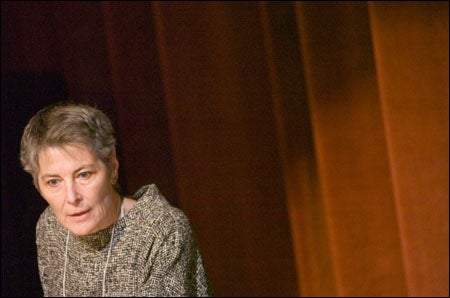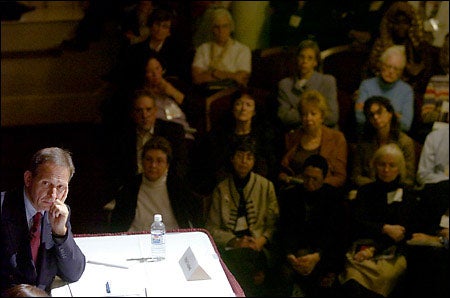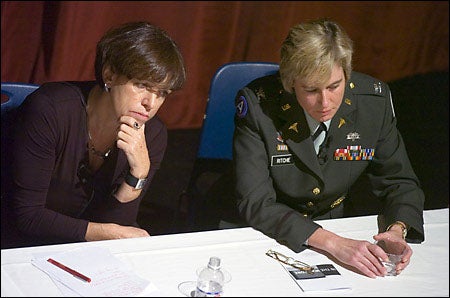Radcliffe examines role of gender in the ‘War Zone’
Two-day conference packs Agassiz Theatre

Geraldine Brooks recalled lying on a Kurdish rooftop in 1991, looking down at a tank below and hearing rifle and rifle-propelled-grenade fire. She was with a group of male reporters, who were excitedly talking about getting to the lines where Kurds were engaging Saddam Hussein’s government troops.
Brooks, a correspondent for the Wall Street Journal and fellow at the Radcliffe Institute for Advanced Study, said she was more interested in capturing the human side of the conflict. She wanted to learn about the women who were calming the children inside the building on which they lay, the women who washed the clothes that were hanging around the reporters, drying in the sunny breeze after several days of rain.
“The men wanted to go to the front lines with the Pesh Merga. I wanted to go inside to see the women quieting the terrified children,” Brooks said.
Brooks described the differences in how men and women correspondents view war and how they are treated during war. She blended her own story with that of Martha Gellhorn, a World War II correspondent for Collier’s Weekly who was discriminated against by the Army, by Collier’s, and, ultimately, by her husband Ernest Hemingway.

The experience of women often differs from that of men during war, but war has never been the wholly male pursuit that exists in the minds of many, according to Brooks and other speakers at the Radcliffe Institute for Advanced Study Friday (Nov. 4).
Women have always been involved in war, speakers said, whether supporting husbands and sons at the front, acting as combatants themselves, suffering atrocities such as systematic rape, mourning the dead, or rebuilding devastated societies in war’s aftermath.
The speakers came to Radcliffe for the two-day conference, “In the War Zone,” which took an unblinking look at the role of gender and warfare.
Jennifer Leaning, senior adviser on international and policy studies at Radcliffe and professor of the practice of international health at the Harvard School of Public Health, said war is so common in human history that it can be considered a “core human activity.” Women and men, Leaning said, have always had a partnership in war.
Panels Thursday and Friday examined topics including military socialization, rape as a weapon of war, the distinction between the home front and the front lines, and remembering and mourning.
Jacqueline Bhabha, executive director of the University Committee on Human Rights Studies, said women have always experienced war, whether suffering loneliness and loss or experiencing sexual violence at the hands of combatants.
“Gender fallout is part and parcel of the business of war,” Bhabha said.
Gilbert Holleufer, who worked on the International Committee on the Red Cross’ People on War Project, said at the Friday morning session on the war front versus the battle front that recent warfare belies the notion of combatants separated from civilians and violent front lines far from peaceful support zones.
Holleufer described the People on War Project’s study of warfare within countries such as Afghanistan, Colombia, and Bosnia, showing the recent conduct of war as an activity with no safe zones and that increasingly counts civilian women and children among its casualties.

“[Study participants] testified about the complete dissolution between the danger of the battlefield and the safety of the home front,” Holleufer said. “An all-encompassing death zone destroys meaning and purpose of life in the safe zone just as it destroys the meaning and purpose of the battle front.”
Holleufer said interviews conducted as part of the study revealed that all-encompassing violence affects recovery after the war, as damaged men return to damaged homes and families, and that women are often left to do much of the rebuilding.
“Men returned home bearing unbearable secrets,” Holleufer said. “The problem of damaged men, women know, is the real problem of postwar reconstruction…. Men are sitting back, doing nothing, drinking, smoking.”
The United States’ war in Iraq is, like all wars, taking a psychological toll, according to Col. Elspeth Cameron Ritchie, psychiatry consultant to the U.S. Army’s Surgeon General and a 1980 Radcliffe graduate. Elspeth detailed the evolution of treatment for battle-related psychiatric illnesses, from shell shock to posttraumatic stress syndrome.
She urged members of the audience to reach out to returning members of the military, saying that the transition to civilian life can be difficult. Those who suffer post-traumatic stress syndrome are at risk for substance abuse or violence. Four years after 9/11, members of the U.S. military have been at war a long time, she said.
“It’s not just an Army medical problem, it’s something that will be affecting our communities as a whole. We need to reach out to our soldiers, our communities, and our veterans,” Ritchie said.
But Brooks said that equality on the battlefield doesn’t ensure equality in society when the fighting stops. It may be, she said, that some offers of equality ought to be rejected.
“Women may have won the right to be in the foxhole, but maybe it is the one right we should approach cautiously,” Brooks said. “Perhaps our place instead is at the barricades arguing for peace.”




